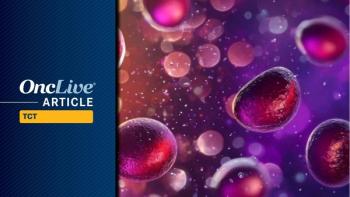
- Vol. 19/No. 16
- Volume 19
- Issue 16
Potency of CAR T-Cell Therapy Investigated in Relapsed/Refractory MCL

Axicabtagene ciloleucel (axi-cel; Yescarta) is being evaluated in patients with relapsed or refractory mantle cell lymphoma—a rare B-cell non-Hodgkin lymphoma that contributes 4200 new patients in the United States each year.
Michael Wang, MD,
Axicabtagene ciloleucel (axi-cel; Yescarta) has previously been approved for the treatment of patients with certain types of large B-cell lymphoma who have not responded to other therapies, and this success has led investigators to test axi-cel in patients with relapsed or refractory (R/R) mantle cell lymphoma (MCL)—a rare B-cell non-Hodgkin lymphoma that contributes 4200 new patients in the United States each year.1
Success After Failure
The anti-CD19 chimeric antigen receptor (CAR) T-cell therapy could be a solution for the remission and relapse observed in patients with MCL. “During this process, drug resistance progressively increases. Eventually, the resistance becomes too much, and the patient stops responding to any therapies and will die from lymphoma,” said Michael Wang, MD, a professor in the department of lymphoma and myeloma at The University of Texas MD Anderson Cancer Center in Houston. Wang added that, with this disease type, patients fail several therapy options and often do not live as long as a year. Their average survival is about 8 months.Axi-cel was approved in October 2017 for the treatment of large B-cell lymphoma after at least 2 other kinds of treatment failed for subtypes including diffuse large B-cell lymphoma (DLBCL), primary mediastinal large B-cell lymphoma, high grade B-cell lymphoma, and DLBCL arising from follicular lymphoma. The approval was based on findings from the ZUMA-1 phase I/II trial (NCT02348216). The primary results of ZUMA-1 presented at the 2017 AACR Annual Meeting showed an ORR of 82% with a CR rate of 54%, and after 8.7 months of follow-up, 39% of patients remained in CR.2
The value of axi-cel in treating R/R MCL will be tested in the multicenter phase II ZUMA-2 clinical trial (NCT02601313) (Figure). The trial will enroll about 130 patients with an ECOG performance score of 0 or 1 who have received no more than 5 prior therapies. Eligible participants must have received an anthracycline- or bendamustine-containing chemotherapy, anti-CD20 monoclonal antibody therapy, and Bruton tyrosine kinase (BTK) inhibitor therapy with ibrutinib (Imbruvica) or acalabrutinib (Calquence).
Figure. Axi-Cel in Patients with R/R MCL
Hope-For Results
Patients will receive a fixed dosage of fludarabine and cyclophosphamide—conditioning chemotherapy daily, followed by a single infusion of axi-cel administered intravenously. The primary endpoint of the trial is the overall response rate (ORR), with duration of response, best objective response, and progression-free survival as the secondary endpoints.“We hope to obtain good efficacy and safety data from this CAR T-cell protocol,” Wang, who is the principal investigator for the trial, said. “If everything is good, we hope we can get this therapy approved for patients with R/R MCL to overcome BTK inhibitor resistance.”
Axi-cel CAR T-cell therapy involves the modification of a patient’s own T cells via lentiviral transduction to express the antigen CD19, which in B-cell lymphomas is a common target for T cells.3 Upon infusion, the modified T cells bind to and induce selective toxicity in CD19-expressing tumor cells.
Promising Findings from ZUMA-1
The patient will receive 3 days of conditioning chemotherapy before modified T cells are infused in his or her system, Wang said. Five days after the patient completes the chemotherapy, the CAR T-cells are reinfused in the patient’s system. “There are 3 major areas [of development] in MCL: targeted therapies, cell therapies, and immunotherapies,” Wang said. “CAR T-cell therapy is a very promising [therapy] to overcome drug resistance.”In phase II of the ZUMA-1 clinical trial, axi-cel demonstrated promising activity in patients with large B-cell lymphomas. Updated long-term results showed that axi-cel induced an ORR of 82%, with a complete response (CR) rate of 58%.4
There were no new cases of cytokine release syndrome (CRS), neurotoxicity, or grade 5 adverse events (AEs), since the primary assessment. In the combined cohort (n = 108), grade ≥3 AEs were experienced by 97% of patients and grade ≥3 serious AEs were seen in 46% of patients. At the 15.4-month assessment, grade ≥3 cytokine release syndrome was experienced by 12% of patients and grade ≥3 neurotoxicity was seen in 31% of patients. Four percent of patients had a grade 5 AE.
R/R MCL is an aggressive and often incurable disease, and much hope and expectation rests on axi-cel for success in this trial. “We are looking forward to improving patients’ quality of life and improving survival,” Wang said. “We welcome patients to our center and invite investigators to collaborate with us to cure MCL.” Results from ZUMA-2 could be available in 2019, Wang said.
The ZUMA-2 trial is sponsored by Kite Pharma, which is owned by Gilead Sciences.
References
- Mantle cell lymphoma facts. Leukemia and Lymphoma Society. lls.org/sites/default/files/file_assets/mantlecelllymphoma.pdf. Accessed August 1, 2018.
- Locke FL, Neelapu SS, Bartlett NL, et al. Primary results from ZUMA-1: a pivotal trial of axicabtagene ciloleucel (Axi-cel; KTE-C19) in patients with refractory aggressive non-Hodgkin lymphoma (NHL). Presented at: 2017 AACR Annual Meeting; April 1-5, 2017; Washington, DC. Abstract CT019. cancerres.aacrjournals.org/content/77/13_Supplement/CT019.
- Axicabtagene ciloleucel. NCI drug dictionary. National Cancer Institute. cancer.gov/publications/dictionaries/cancer-drug/def/ axicabtagene-ciloleucel. Accessed July 25, 2018.
- Neelapu SS, Locke FL, Bartlett NL, et al. Long-term follow-up ZUMA-1: a pivotal trial of axicabtagene ciloleucel (axi-cel; KTE-C19) in patients with refractory aggressive non-Hodgkin lymphoma (NHL). Presented at: ASH Annual Meeting and Exposition; December 9-12, 2017; Atlanta, GA. Abstract 578. bloodjournal.org/content/130/ Suppl_1/578?sso-checked=true.
Articles in this issue
over 7 years ago
Expanded Scalp Cooling Approval Offers Patients More Choicesover 7 years ago
Experts Delve Into 4 Phenotypes of Advanced Prostate Cancerover 7 years ago
Neoadjuvant Immunotherapy Emerges as a New Frontierover 7 years ago
Master of the Whipple Gave Hope, Extended Livesover 7 years ago
New Recommendations Improve Accuracy of HER2 Status Designationover 7 years ago
Patient-Experienced Toxicity Is a Biomarker Worth Considering





































